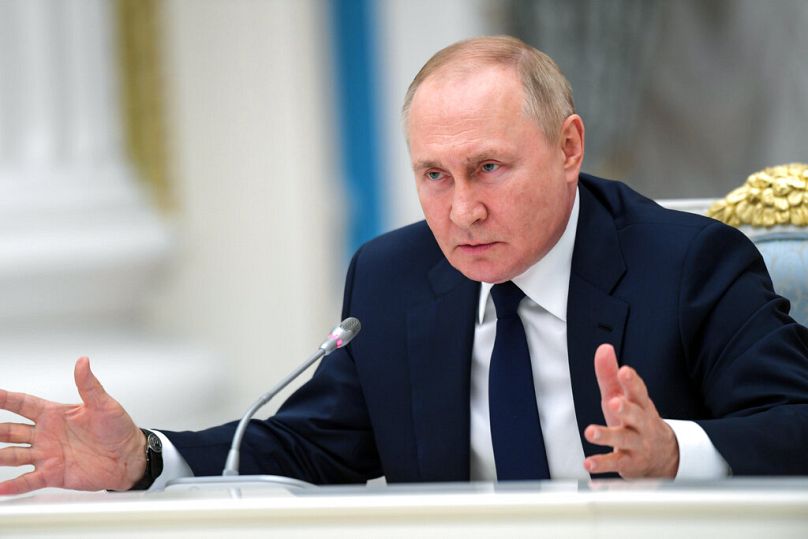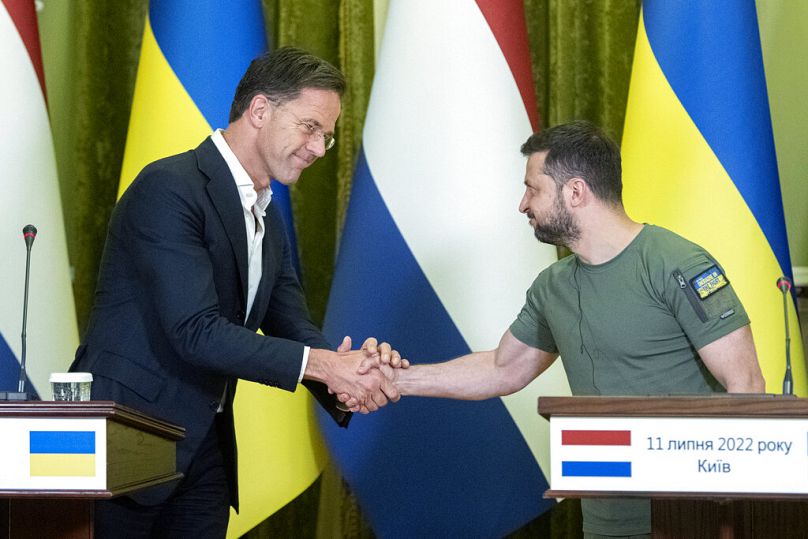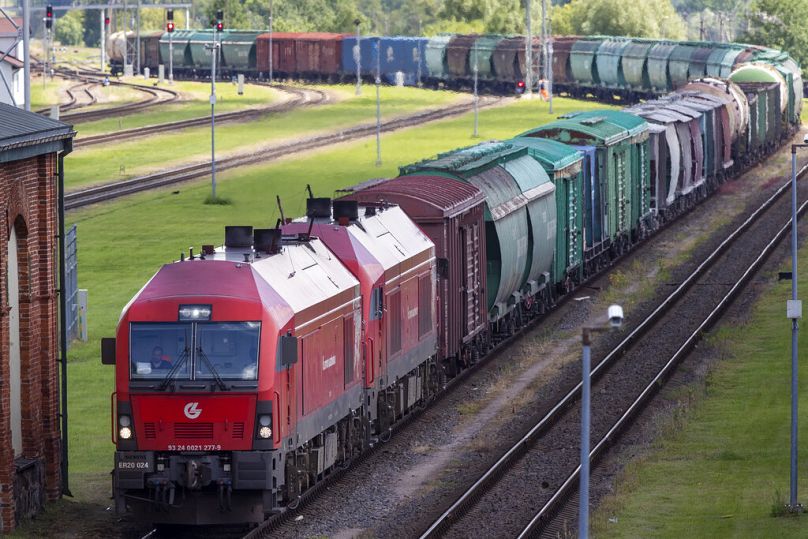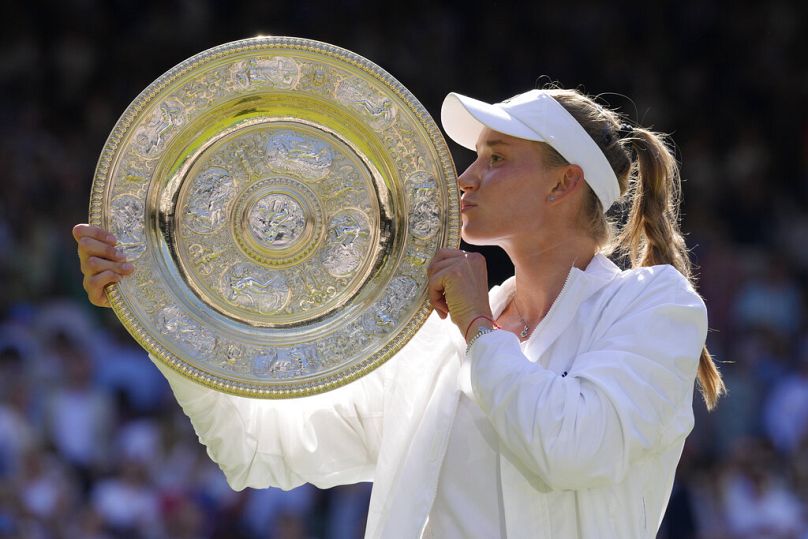Russian strikes targets civilian infrastructure, Dutch PM visits Kyiv, Lithuania tightens restrictions on Kaliningrad and a tennis dispute over Kazakh player.
1. Ukraine denounces 'absolute terrorism' of Russian strikes on civilian targets
At least three people have been killed and scores more wounded - including children - after Russian forces launched a new wave of attacks on Ukraine's second largest city Kharkiv.
The regional governor called the strikes - on a school, a residential building and a warehouse facvility - "absolute terrorism."
“All (three were launched) exclusively on civilian objects, this is absolute terrorism!” said Oleh Syniehubov.
Hours after this first attack, shelling which officials said came from multiple rocket launchers, hit more civilian targets.
“Only civilian structures, a shopping centre and houses of peaceful Kharkiv residents, came under the fire of the Russians. Several shells hit the yards of private houses. Garages and cars were also destroyed, several fires broke out,” Syniehubov wrote online.
The new strikes came just two days after a Russian rocket attack hit apartment buildings in eastern Ukraine, killing at least 24 people. A total of nine people have been rescued, emergency officials said.
2. Put expands 'fast track' Russian citizenship for all Ukrainians
Russian President Vladimir Putin signed a decree on Monday expanding a fast track to Russian citizenship to all Ukrainians.
Until recently, only residents of Ukraine's eastern Donetsk and Luhansk regions, as well as residents of the southern Zaporizhzhia and the Kherson regions, large parts of which are under Russian control, were eligible for the simplified procedure.
Between 2019, when the procedure was first introduced for the residents of Donetsk and Luhansk, and this year more than 720,000 residents of the rebel-held areas in the two regions – about 18% of the population – have received Russian passports.
In late May this year, three months after Russia invaded Ukraine, the fast-track procedure was also offered to residents of the Zaporizhzhia and Kherson regions. A month ago the first Russian passports were reportedly handed out there.
3. Dutch PM warns 'war could last longer than expected'
Dutch Prime Minister Mark Rutte said the war in Ukraine could last longer than expected, but that Western countries must "continue to support Ukraine in every way possible."
Rutte made the comments during a visit to Kyiv on Monday where he met with President Zelenskyy.
"This war may last longer than we had anticipated or hoped for. But that doesn't mean we can sit back and passively watch how it unfolds," Rutte told journalists.
"We need to stay focused and continue to support Ukraine in any way we can," he added.
Earlier, Rutte visited the town of Irpin, saying that he wanted to see for himself the impact of the Russian invasion.
"This is totally unacceptable," he said, after walking through a residential area where many buildings were left destroyed.
The PM said he hoped to use his visit to explain to the Dutch why it was important to support the people of Ukraine.
"This is about civilisation, about the fact that you can never accept one country invading another - and this is happening two and half hours flight from Amsterdam," he said.
4. Lithuania expands trade restrictions to Kaliningrad
Lithuania on Monday expanded restrictions on trade through its territory to Russia's Baltic exclave of Kaliningrad, as more European Union sanctions against Moscow over its invasion of Ukraine took effect.
Additional goods barred from Monday morning include concrete, wood, alcohol and alcohol-based industrial chemicals, a spokesperson for Lithuanian customs said.
Lithuanian Railways estimated that the restrictions would apply to the equivalent of about 15% of the 3.7 million tonnes of cargo it transported from Russia to Kaliningrad in the first half of 2022. That includes expanding a ban on ferrous metals which began last month.
Kaliningrad, a Baltic port and environs home to around 1 million people, was annexed by the Soviet Union from Germany after World War Two and is connected to the rest of Russia only through EU territory, mainly rail via Belarus through Lithuania.
Moscow says the ban on overland transit of some goods amounts to an illegal blockade; Lithuania says it has no choice but to enforce sanctions imposed by Brussels.
Russia warned Lithuania and the European Union on Friday that it could adopt "harsh measures" against them if the transit of some goods to and from Kaliningrad did not resume "within the coming days". read more
On Monday, the Kaliningrad regional governor proposed a ban on movement of goods between Russia and the three EU Baltic member states Lithuania, Latvia and Estonia, apart from transit to Kaliningrad. That could divert Russian freight from their ports.
5. Russia claims credit for Rybakina's Wimbledon win
The Russian Tennis Federation has praised Elena Rybakina as “our product” on her way to becoming Wimbledon women's singles champion on Saturday.
Rybakina, who plays for Kazakhstan, was born in Moscow and played in the Russian system until 2018, when financial issues led to her nationality switch.
“It’s the Russian school, after all. She played here with us for a long time, and then in Kazakhstan,” Russian Tennis Federation president Shamil Tarpishchev told sports website Championat on Saturday after Rybakina beat Ons Jabeur 3-6, 6-2, 6-2 on Centre Court.
There's been no official reaction from the Kremlin on Rybakina's Wimbledon success, but some commentators have claimed her victory as a Russian achievement and a symbolic snub to the All England Club's ban on players representing Russia and Belarus.
Players from those countries were banned from the Wimbledon tournament because of Russia's invasion of Ukraine.
Some Russian state media outlets emphasized Rybakina's roots in Moscow, with others opting to call her simply a “representative of Kazakhstan.”
The last Russian woman to win a Grand Slam singles title was Maria Sharapova at the French Open in 2014. Moscow-born Sofia Kenin, who left Russia as a baby and plays for the United States, won the Australian Open in 2020.
Kazakhstan, meanwhile, is ecstatic at having its first Grand Slam singles champion.
“Kazakhstani tennis player Elena Rybakina has achieved a historic victory in the extremely prestigious Wimbledon tournament. I heartily congratulate this outstanding athlete!” President Kassym-Jomart Tokayev wrote on Twitter.















